Quality Management in Hospitality: A Case Study of Airbnb
VerifiedAdded on 2023/01/13
|11
|3190
|54
Report
AI Summary
This report provides an in-depth analysis of quality management within Airbnb, a prominent online marketplace for tourism and lodging services. It begins with an executive summary and introduction, followed by a detailed exploration of quality management concepts, including quality control, quality assurance, total quality control, and total quality management. The report uses Airbnb as a case study, examining issues such as booking cancellations, data scams, legal challenges, and customer service problems. It also evaluates the dimensions of service quality (reliability, responsiveness, assurance, empathy, and tangibles) in the context of Airbnb. Furthermore, the report discusses the impact of Key Performance Indicators (KPIs) on delivering consistent and effective quality management, including the advantages and disadvantages of using KPIs. Finally, the report offers recommendations for Airbnb to improve its quality management practices and enhance customer satisfaction.
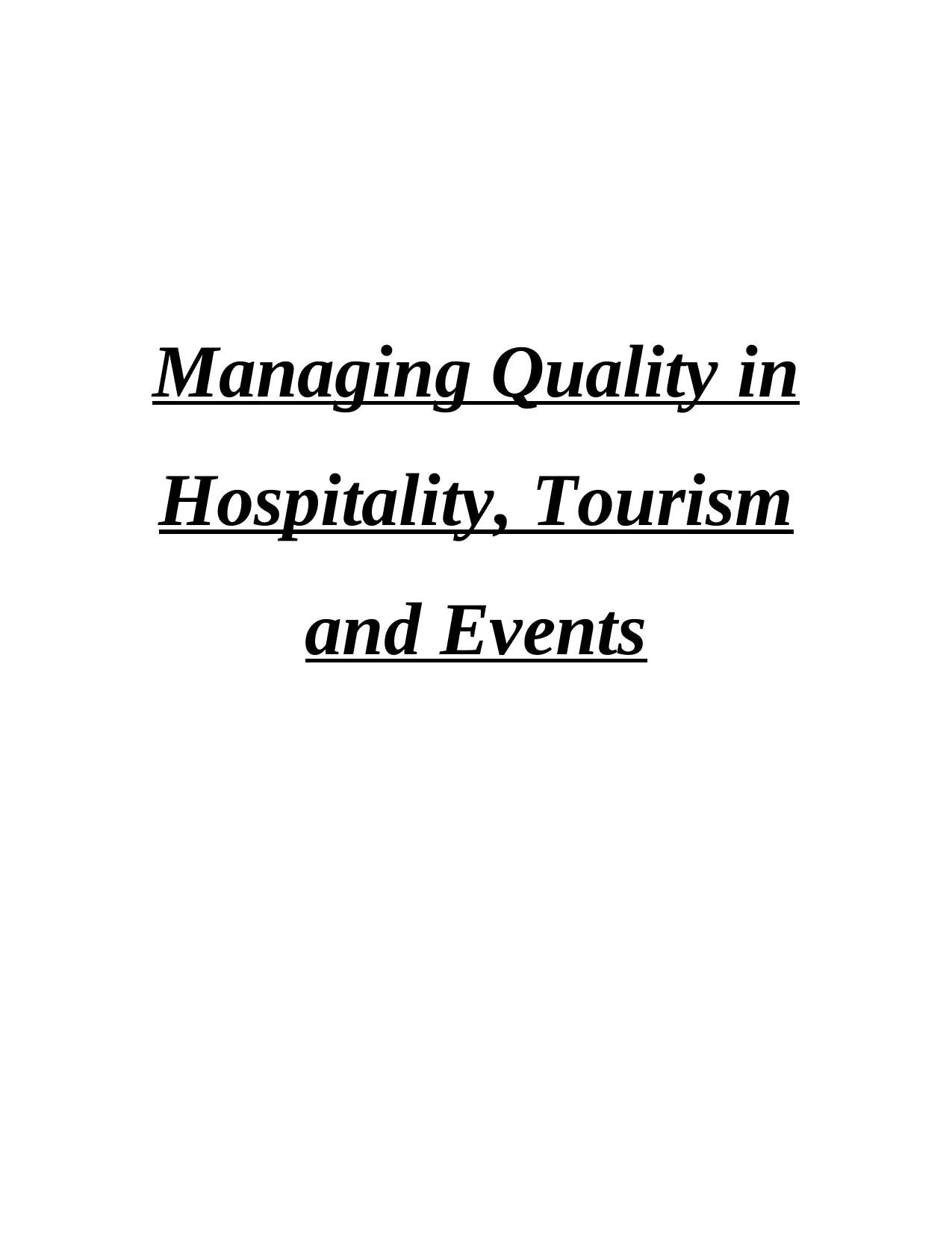
Managing Quality in
Hospitality, Tourism
and Events
Hospitality, Tourism
and Events
Paraphrase This Document
Need a fresh take? Get an instant paraphrase of this document with our AI Paraphraser
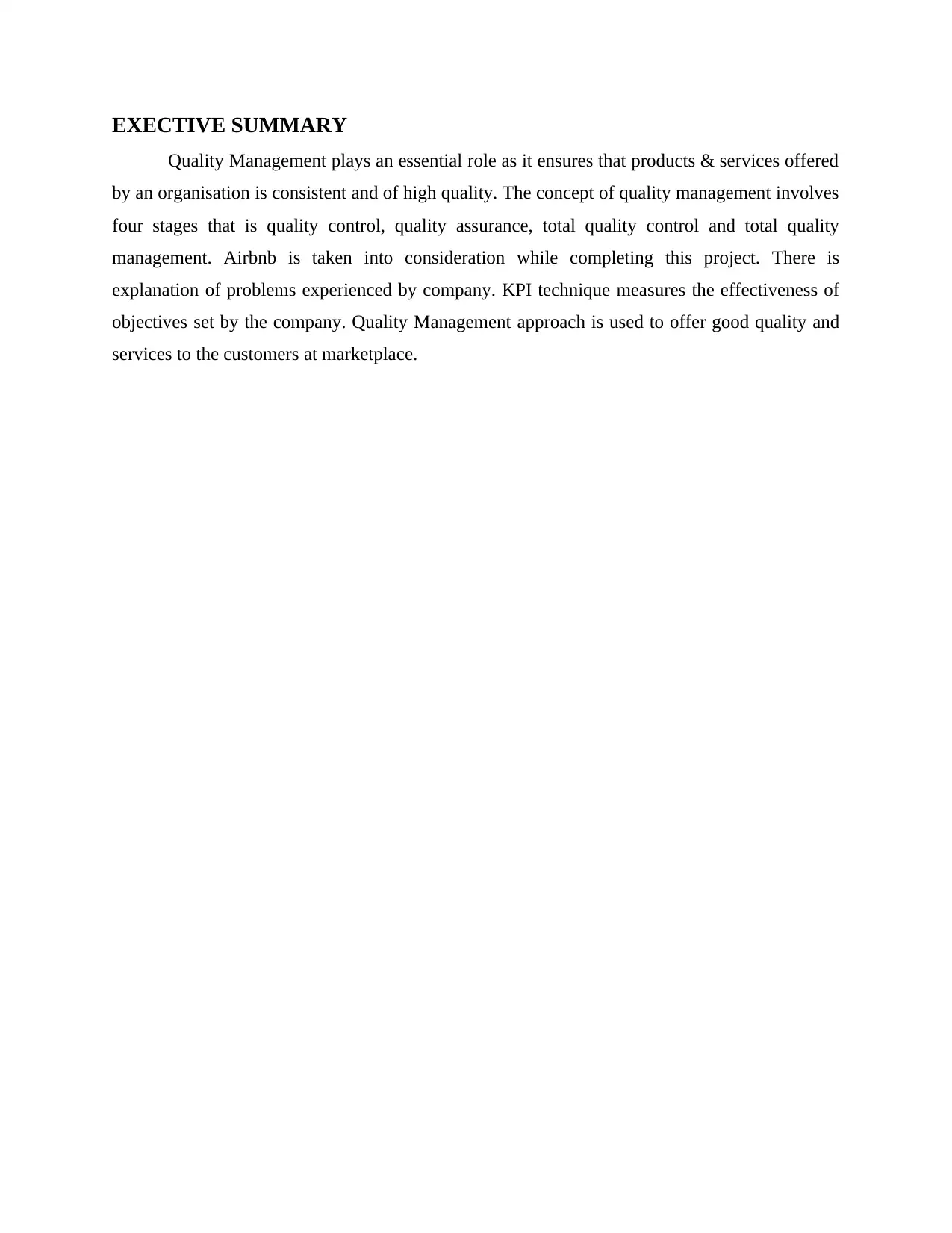
EXECTIVE SUMMARY
Quality Management plays an essential role as it ensures that products & services offered
by an organisation is consistent and of high quality. The concept of quality management involves
four stages that is quality control, quality assurance, total quality control and total quality
management. Airbnb is taken into consideration while completing this project. There is
explanation of problems experienced by company. KPI technique measures the effectiveness of
objectives set by the company. Quality Management approach is used to offer good quality and
services to the customers at marketplace.
Quality Management plays an essential role as it ensures that products & services offered
by an organisation is consistent and of high quality. The concept of quality management involves
four stages that is quality control, quality assurance, total quality control and total quality
management. Airbnb is taken into consideration while completing this project. There is
explanation of problems experienced by company. KPI technique measures the effectiveness of
objectives set by the company. Quality Management approach is used to offer good quality and
services to the customers at marketplace.
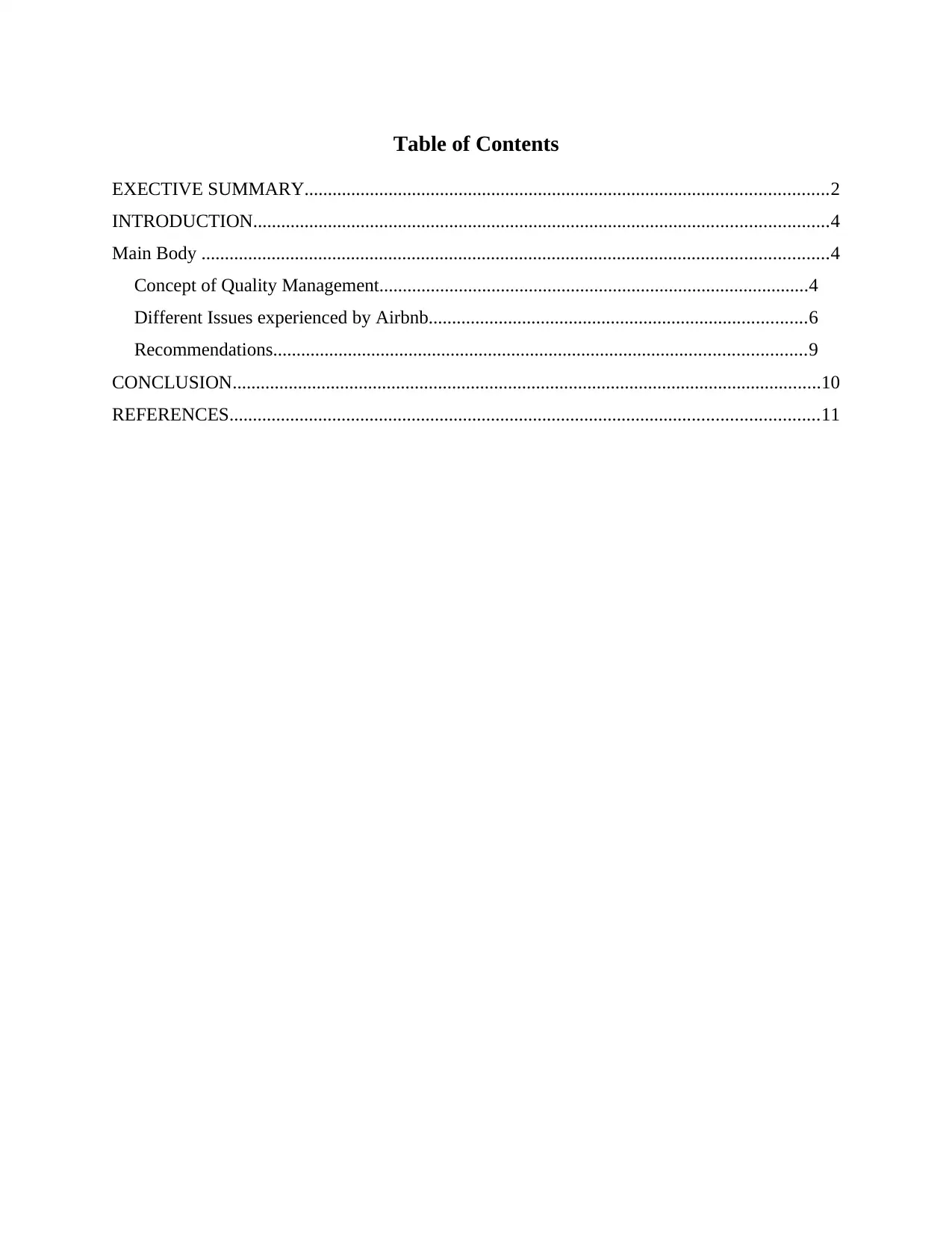
Table of Contents
EXECTIVE SUMMARY................................................................................................................2
INTRODUCTION...........................................................................................................................4
Main Body ......................................................................................................................................4
Concept of Quality Management............................................................................................4
Different Issues experienced by Airbnb.................................................................................6
Recommendations..................................................................................................................9
CONCLUSION..............................................................................................................................10
REFERENCES..............................................................................................................................11
EXECTIVE SUMMARY................................................................................................................2
INTRODUCTION...........................................................................................................................4
Main Body ......................................................................................................................................4
Concept of Quality Management............................................................................................4
Different Issues experienced by Airbnb.................................................................................6
Recommendations..................................................................................................................9
CONCLUSION..............................................................................................................................10
REFERENCES..............................................................................................................................11
⊘ This is a preview!⊘
Do you want full access?
Subscribe today to unlock all pages.

Trusted by 1+ million students worldwide
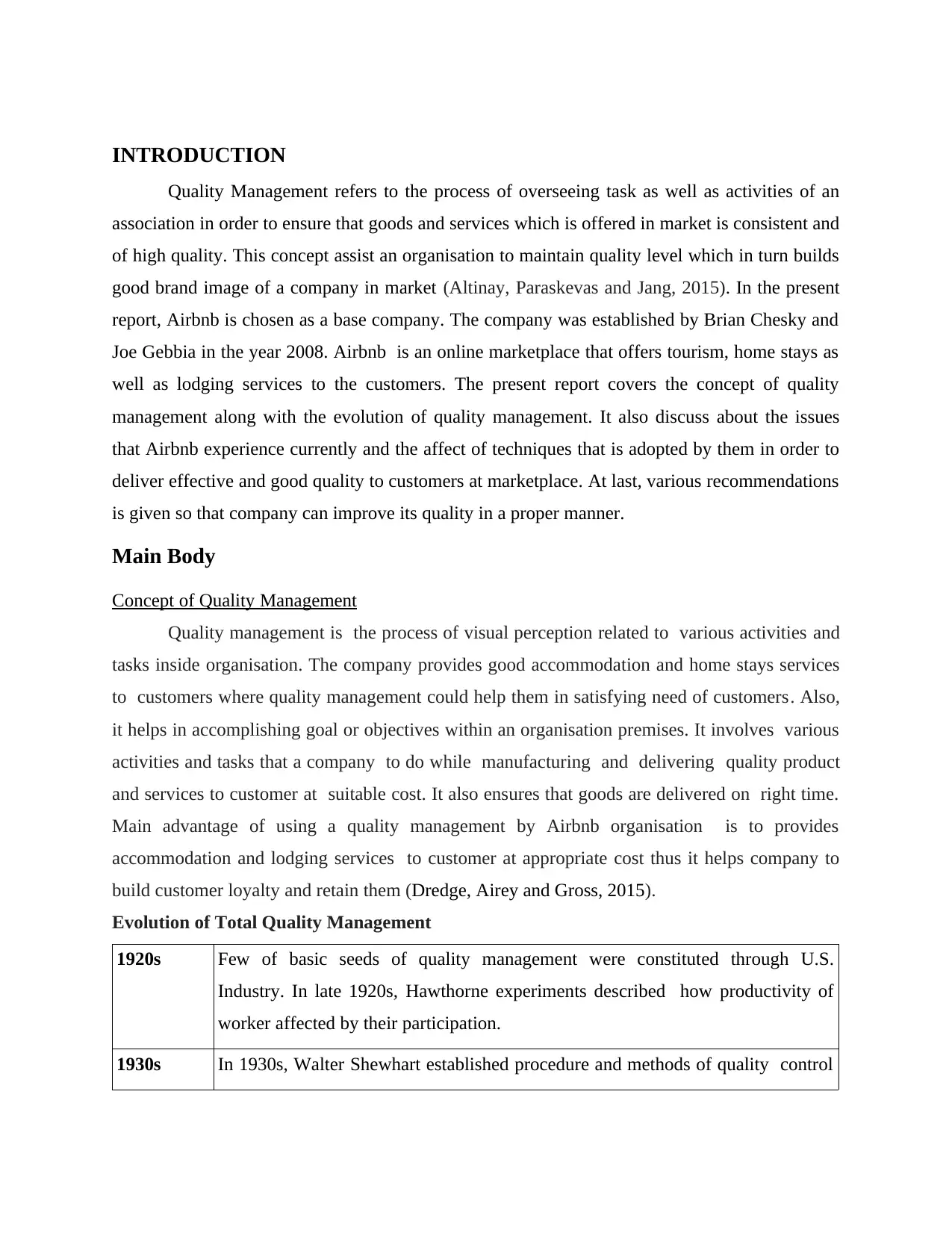
INTRODUCTION
Quality Management refers to the process of overseeing task as well as activities of an
association in order to ensure that goods and services which is offered in market is consistent and
of high quality. This concept assist an organisation to maintain quality level which in turn builds
good brand image of a company in market (Altinay, Paraskevas and Jang, 2015). In the present
report, Airbnb is chosen as a base company. The company was established by Brian Chesky and
Joe Gebbia in the year 2008. Airbnb is an online marketplace that offers tourism, home stays as
well as lodging services to the customers. The present report covers the concept of quality
management along with the evolution of quality management. It also discuss about the issues
that Airbnb experience currently and the affect of techniques that is adopted by them in order to
deliver effective and good quality to customers at marketplace. At last, various recommendations
is given so that company can improve its quality in a proper manner.
Main Body
Concept of Quality Management
Quality management is the process of visual perception related to various activities and
tasks inside organisation. The company provides good accommodation and home stays services
to customers where quality management could help them in satisfying need of customers. Also,
it helps in accomplishing goal or objectives within an organisation premises. It involves various
activities and tasks that a company to do while manufacturing and delivering quality product
and services to customer at suitable cost. It also ensures that goods are delivered on right time.
Main advantage of using a quality management by Airbnb organisation is to provides
accommodation and lodging services to customer at appropriate cost thus it helps company to
build customer loyalty and retain them (Dredge, Airey and Gross, 2015).
Evolution of Total Quality Management
1920s Few of basic seeds of quality management were constituted through U.S.
Industry. In late 1920s, Hawthorne experiments described how productivity of
worker affected by their participation.
1930s In 1930s, Walter Shewhart established procedure and methods of quality control
Quality Management refers to the process of overseeing task as well as activities of an
association in order to ensure that goods and services which is offered in market is consistent and
of high quality. This concept assist an organisation to maintain quality level which in turn builds
good brand image of a company in market (Altinay, Paraskevas and Jang, 2015). In the present
report, Airbnb is chosen as a base company. The company was established by Brian Chesky and
Joe Gebbia in the year 2008. Airbnb is an online marketplace that offers tourism, home stays as
well as lodging services to the customers. The present report covers the concept of quality
management along with the evolution of quality management. It also discuss about the issues
that Airbnb experience currently and the affect of techniques that is adopted by them in order to
deliver effective and good quality to customers at marketplace. At last, various recommendations
is given so that company can improve its quality in a proper manner.
Main Body
Concept of Quality Management
Quality management is the process of visual perception related to various activities and
tasks inside organisation. The company provides good accommodation and home stays services
to customers where quality management could help them in satisfying need of customers. Also,
it helps in accomplishing goal or objectives within an organisation premises. It involves various
activities and tasks that a company to do while manufacturing and delivering quality product
and services to customer at suitable cost. It also ensures that goods are delivered on right time.
Main advantage of using a quality management by Airbnb organisation is to provides
accommodation and lodging services to customer at appropriate cost thus it helps company to
build customer loyalty and retain them (Dredge, Airey and Gross, 2015).
Evolution of Total Quality Management
1920s Few of basic seeds of quality management were constituted through U.S.
Industry. In late 1920s, Hawthorne experiments described how productivity of
worker affected by their participation.
1930s In 1930s, Walter Shewhart established procedure and methods of quality control
Paraphrase This Document
Need a fresh take? Get an instant paraphrase of this document with our AI Paraphraser
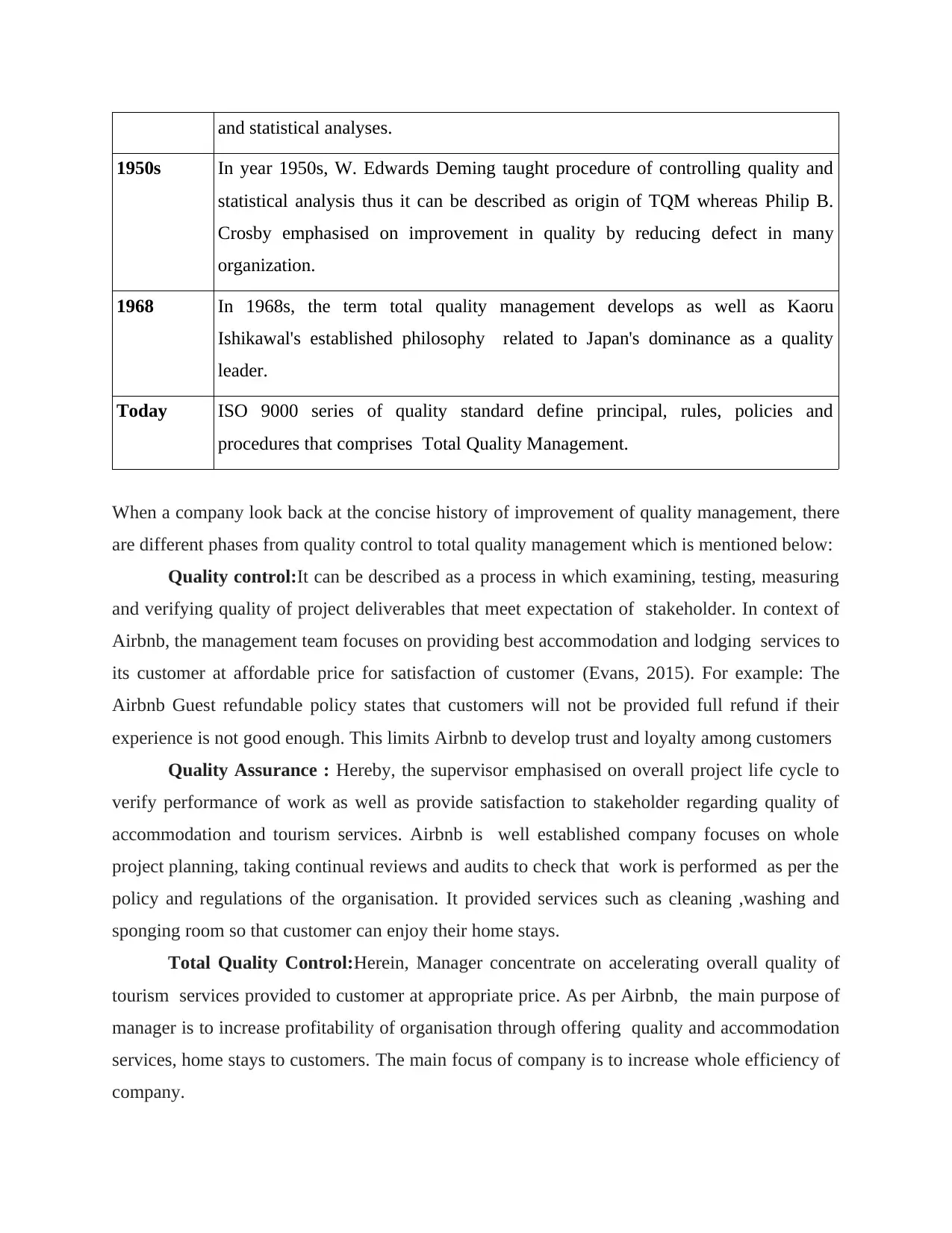
and statistical analyses.
1950s In year 1950s, W. Edwards Deming taught procedure of controlling quality and
statistical analysis thus it can be described as origin of TQM whereas Philip B.
Crosby emphasised on improvement in quality by reducing defect in many
organization.
1968 In 1968s, the term total quality management develops as well as Kaoru
Ishikawal's established philosophy related to Japan's dominance as a quality
leader.
Today ISO 9000 series of quality standard define principal, rules, policies and
procedures that comprises Total Quality Management.
When a company look back at the concise history of improvement of quality management, there
are different phases from quality control to total quality management which is mentioned below:
Quality control:It can be described as a process in which examining, testing, measuring
and verifying quality of project deliverables that meet expectation of stakeholder. In context of
Airbnb, the management team focuses on providing best accommodation and lodging services to
its customer at affordable price for satisfaction of customer (Evans, 2015). For example: The
Airbnb Guest refundable policy states that customers will not be provided full refund if their
experience is not good enough. This limits Airbnb to develop trust and loyalty among customers
Quality Assurance : Hereby, the supervisor emphasised on overall project life cycle to
verify performance of work as well as provide satisfaction to stakeholder regarding quality of
accommodation and tourism services. Airbnb is well established company focuses on whole
project planning, taking continual reviews and audits to check that work is performed as per the
policy and regulations of the organisation. It provided services such as cleaning ,washing and
sponging room so that customer can enjoy their home stays.
Total Quality Control:Herein, Manager concentrate on accelerating overall quality of
tourism services provided to customer at appropriate price. As per Airbnb, the main purpose of
manager is to increase profitability of organisation through offering quality and accommodation
services, home stays to customers. The main focus of company is to increase whole efficiency of
company.
1950s In year 1950s, W. Edwards Deming taught procedure of controlling quality and
statistical analysis thus it can be described as origin of TQM whereas Philip B.
Crosby emphasised on improvement in quality by reducing defect in many
organization.
1968 In 1968s, the term total quality management develops as well as Kaoru
Ishikawal's established philosophy related to Japan's dominance as a quality
leader.
Today ISO 9000 series of quality standard define principal, rules, policies and
procedures that comprises Total Quality Management.
When a company look back at the concise history of improvement of quality management, there
are different phases from quality control to total quality management which is mentioned below:
Quality control:It can be described as a process in which examining, testing, measuring
and verifying quality of project deliverables that meet expectation of stakeholder. In context of
Airbnb, the management team focuses on providing best accommodation and lodging services to
its customer at affordable price for satisfaction of customer (Evans, 2015). For example: The
Airbnb Guest refundable policy states that customers will not be provided full refund if their
experience is not good enough. This limits Airbnb to develop trust and loyalty among customers
Quality Assurance : Hereby, the supervisor emphasised on overall project life cycle to
verify performance of work as well as provide satisfaction to stakeholder regarding quality of
accommodation and tourism services. Airbnb is well established company focuses on whole
project planning, taking continual reviews and audits to check that work is performed as per the
policy and regulations of the organisation. It provided services such as cleaning ,washing and
sponging room so that customer can enjoy their home stays.
Total Quality Control:Herein, Manager concentrate on accelerating overall quality of
tourism services provided to customer at appropriate price. As per Airbnb, the main purpose of
manager is to increase profitability of organisation through offering quality and accommodation
services, home stays to customers. The main focus of company is to increase whole efficiency of
company.
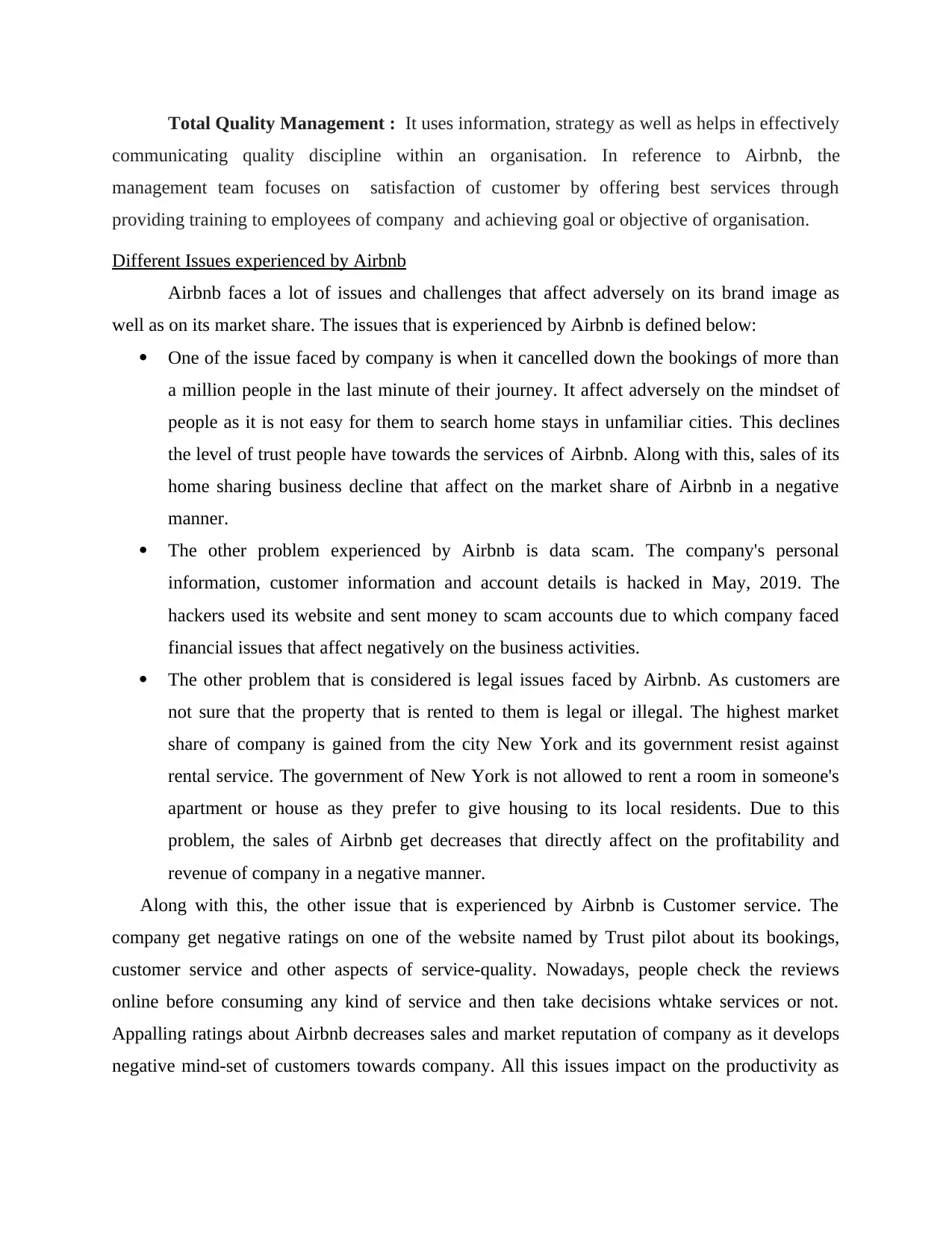
Total Quality Management : It uses information, strategy as well as helps in effectively
communicating quality discipline within an organisation. In reference to Airbnb, the
management team focuses on satisfaction of customer by offering best services through
providing training to employees of company and achieving goal or objective of organisation.
Different Issues experienced by Airbnb
Airbnb faces a lot of issues and challenges that affect adversely on its brand image as
well as on its market share. The issues that is experienced by Airbnb is defined below:
One of the issue faced by company is when it cancelled down the bookings of more than
a million people in the last minute of their journey. It affect adversely on the mindset of
people as it is not easy for them to search home stays in unfamiliar cities. This declines
the level of trust people have towards the services of Airbnb. Along with this, sales of its
home sharing business decline that affect on the market share of Airbnb in a negative
manner.
The other problem experienced by Airbnb is data scam. The company's personal
information, customer information and account details is hacked in May, 2019. The
hackers used its website and sent money to scam accounts due to which company faced
financial issues that affect negatively on the business activities.
The other problem that is considered is legal issues faced by Airbnb. As customers are
not sure that the property that is rented to them is legal or illegal. The highest market
share of company is gained from the city New York and its government resist against
rental service. The government of New York is not allowed to rent a room in someone's
apartment or house as they prefer to give housing to its local residents. Due to this
problem, the sales of Airbnb get decreases that directly affect on the profitability and
revenue of company in a negative manner.
Along with this, the other issue that is experienced by Airbnb is Customer service. The
company get negative ratings on one of the website named by Trust pilot about its bookings,
customer service and other aspects of service-quality. Nowadays, people check the reviews
online before consuming any kind of service and then take decisions whtake services or not.
Appalling ratings about Airbnb decreases sales and market reputation of company as it develops
negative mind-set of customers towards company. All this issues impact on the productivity as
communicating quality discipline within an organisation. In reference to Airbnb, the
management team focuses on satisfaction of customer by offering best services through
providing training to employees of company and achieving goal or objective of organisation.
Different Issues experienced by Airbnb
Airbnb faces a lot of issues and challenges that affect adversely on its brand image as
well as on its market share. The issues that is experienced by Airbnb is defined below:
One of the issue faced by company is when it cancelled down the bookings of more than
a million people in the last minute of their journey. It affect adversely on the mindset of
people as it is not easy for them to search home stays in unfamiliar cities. This declines
the level of trust people have towards the services of Airbnb. Along with this, sales of its
home sharing business decline that affect on the market share of Airbnb in a negative
manner.
The other problem experienced by Airbnb is data scam. The company's personal
information, customer information and account details is hacked in May, 2019. The
hackers used its website and sent money to scam accounts due to which company faced
financial issues that affect negatively on the business activities.
The other problem that is considered is legal issues faced by Airbnb. As customers are
not sure that the property that is rented to them is legal or illegal. The highest market
share of company is gained from the city New York and its government resist against
rental service. The government of New York is not allowed to rent a room in someone's
apartment or house as they prefer to give housing to its local residents. Due to this
problem, the sales of Airbnb get decreases that directly affect on the profitability and
revenue of company in a negative manner.
Along with this, the other issue that is experienced by Airbnb is Customer service. The
company get negative ratings on one of the website named by Trust pilot about its bookings,
customer service and other aspects of service-quality. Nowadays, people check the reviews
online before consuming any kind of service and then take decisions whtake services or not.
Appalling ratings about Airbnb decreases sales and market reputation of company as it develops
negative mind-set of customers towards company. All this issues impact on the productivity as
⊘ This is a preview!⊘
Do you want full access?
Subscribe today to unlock all pages.

Trusted by 1+ million students worldwide
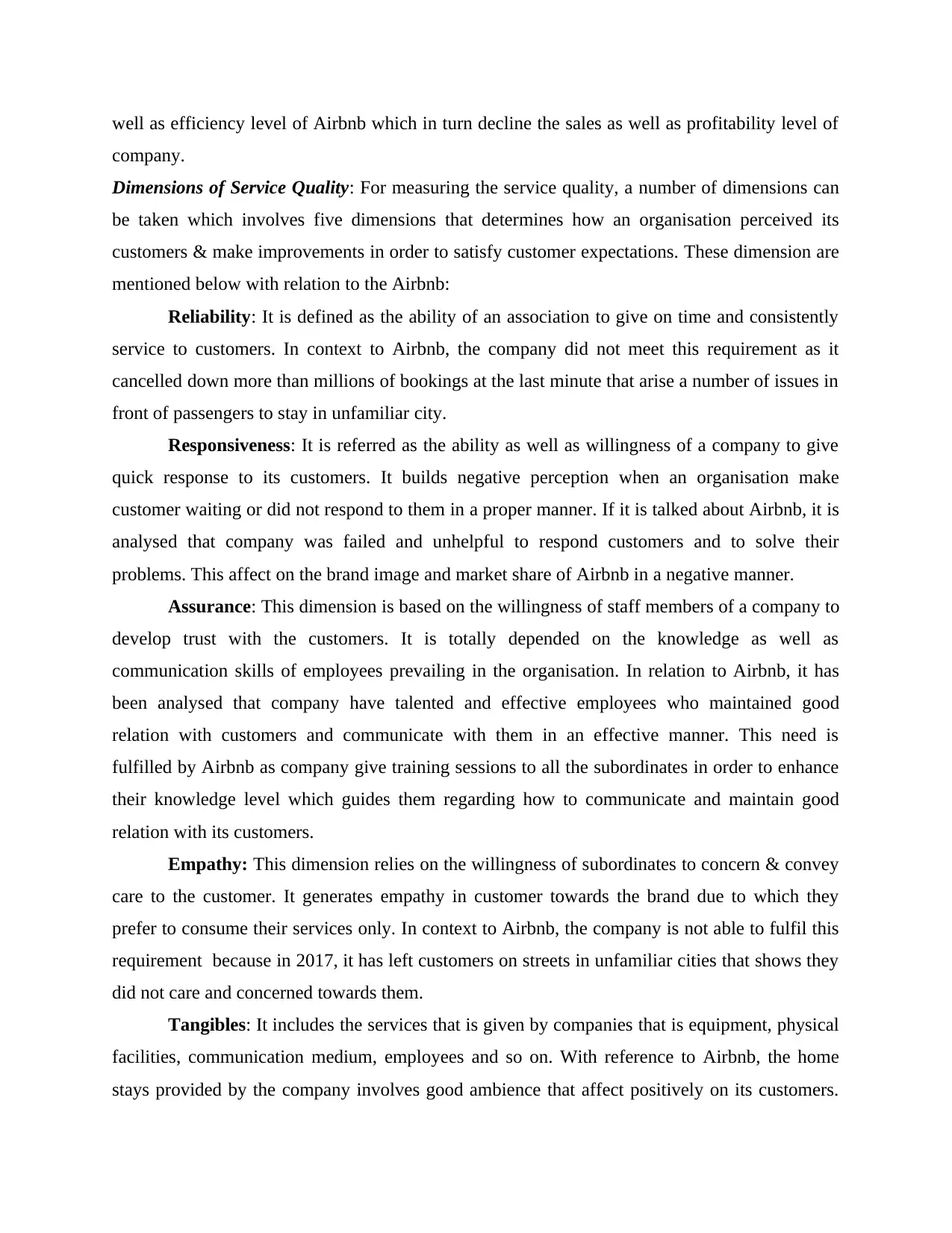
well as efficiency level of Airbnb which in turn decline the sales as well as profitability level of
company.
Dimensions of Service Quality: For measuring the service quality, a number of dimensions can
be taken which involves five dimensions that determines how an organisation perceived its
customers & make improvements in order to satisfy customer expectations. These dimension are
mentioned below with relation to the Airbnb:
Reliability: It is defined as the ability of an association to give on time and consistently
service to customers. In context to Airbnb, the company did not meet this requirement as it
cancelled down more than millions of bookings at the last minute that arise a number of issues in
front of passengers to stay in unfamiliar city.
Responsiveness: It is referred as the ability as well as willingness of a company to give
quick response to its customers. It builds negative perception when an organisation make
customer waiting or did not respond to them in a proper manner. If it is talked about Airbnb, it is
analysed that company was failed and unhelpful to respond customers and to solve their
problems. This affect on the brand image and market share of Airbnb in a negative manner.
Assurance: This dimension is based on the willingness of staff members of a company to
develop trust with the customers. It is totally depended on the knowledge as well as
communication skills of employees prevailing in the organisation. In relation to Airbnb, it has
been analysed that company have talented and effective employees who maintained good
relation with customers and communicate with them in an effective manner. This need is
fulfilled by Airbnb as company give training sessions to all the subordinates in order to enhance
their knowledge level which guides them regarding how to communicate and maintain good
relation with its customers.
Empathy: This dimension relies on the willingness of subordinates to concern & convey
care to the customer. It generates empathy in customer towards the brand due to which they
prefer to consume their services only. In context to Airbnb, the company is not able to fulfil this
requirement because in 2017, it has left customers on streets in unfamiliar cities that shows they
did not care and concerned towards them.
Tangibles: It includes the services that is given by companies that is equipment, physical
facilities, communication medium, employees and so on. With reference to Airbnb, the home
stays provided by the company involves good ambience that affect positively on its customers.
company.
Dimensions of Service Quality: For measuring the service quality, a number of dimensions can
be taken which involves five dimensions that determines how an organisation perceived its
customers & make improvements in order to satisfy customer expectations. These dimension are
mentioned below with relation to the Airbnb:
Reliability: It is defined as the ability of an association to give on time and consistently
service to customers. In context to Airbnb, the company did not meet this requirement as it
cancelled down more than millions of bookings at the last minute that arise a number of issues in
front of passengers to stay in unfamiliar city.
Responsiveness: It is referred as the ability as well as willingness of a company to give
quick response to its customers. It builds negative perception when an organisation make
customer waiting or did not respond to them in a proper manner. If it is talked about Airbnb, it is
analysed that company was failed and unhelpful to respond customers and to solve their
problems. This affect on the brand image and market share of Airbnb in a negative manner.
Assurance: This dimension is based on the willingness of staff members of a company to
develop trust with the customers. It is totally depended on the knowledge as well as
communication skills of employees prevailing in the organisation. In relation to Airbnb, it has
been analysed that company have talented and effective employees who maintained good
relation with customers and communicate with them in an effective manner. This need is
fulfilled by Airbnb as company give training sessions to all the subordinates in order to enhance
their knowledge level which guides them regarding how to communicate and maintain good
relation with its customers.
Empathy: This dimension relies on the willingness of subordinates to concern & convey
care to the customer. It generates empathy in customer towards the brand due to which they
prefer to consume their services only. In context to Airbnb, the company is not able to fulfil this
requirement because in 2017, it has left customers on streets in unfamiliar cities that shows they
did not care and concerned towards them.
Tangibles: It includes the services that is given by companies that is equipment, physical
facilities, communication medium, employees and so on. With reference to Airbnb, the home
stays provided by the company involves good ambience that affect positively on its customers.
Paraphrase This Document
Need a fresh take? Get an instant paraphrase of this document with our AI Paraphraser
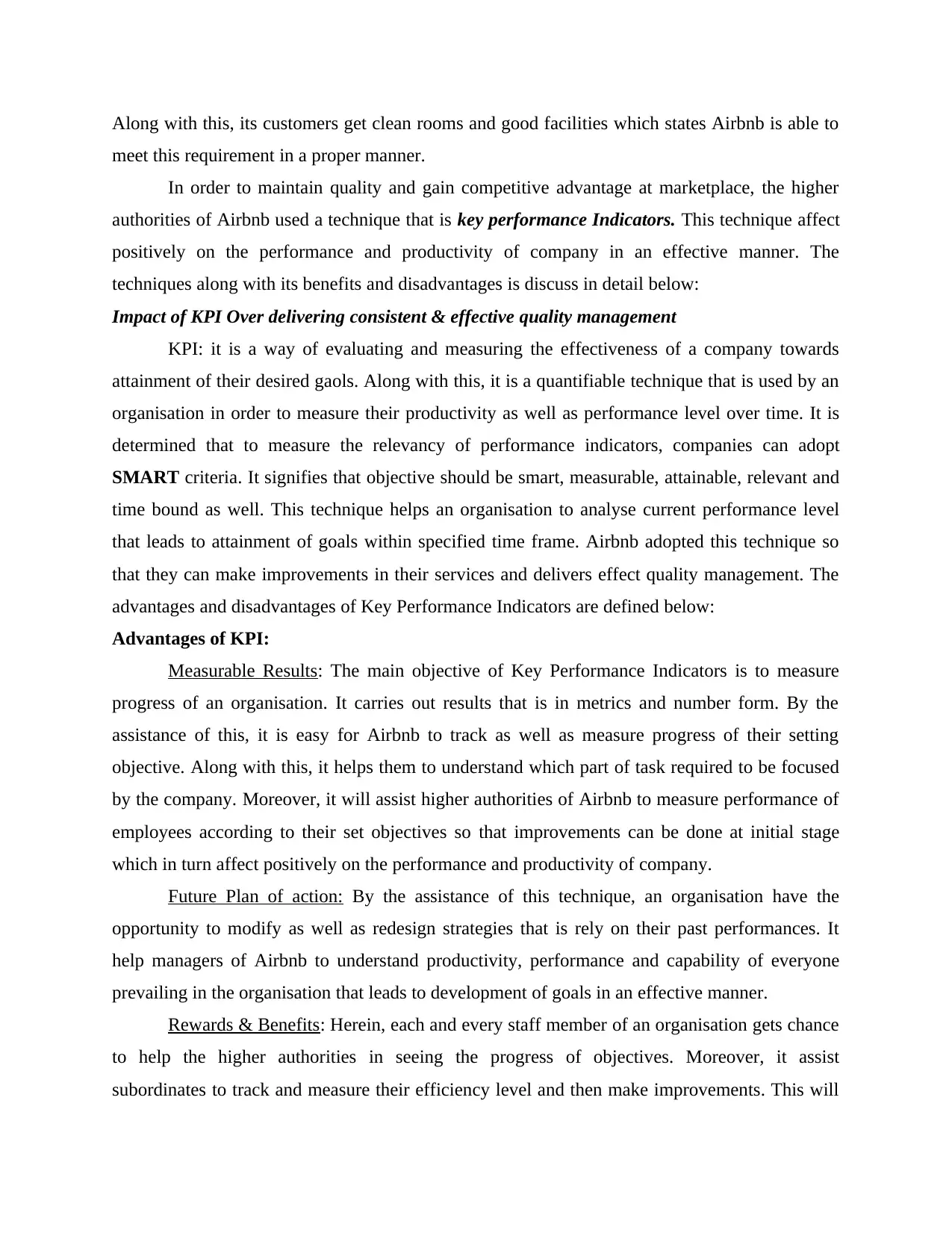
Along with this, its customers get clean rooms and good facilities which states Airbnb is able to
meet this requirement in a proper manner.
In order to maintain quality and gain competitive advantage at marketplace, the higher
authorities of Airbnb used a technique that is key performance Indicators. This technique affect
positively on the performance and productivity of company in an effective manner. The
techniques along with its benefits and disadvantages is discuss in detail below:
Impact of KPI Over delivering consistent & effective quality management
KPI: it is a way of evaluating and measuring the effectiveness of a company towards
attainment of their desired gaols. Along with this, it is a quantifiable technique that is used by an
organisation in order to measure their productivity as well as performance level over time. It is
determined that to measure the relevancy of performance indicators, companies can adopt
SMART criteria. It signifies that objective should be smart, measurable, attainable, relevant and
time bound as well. This technique helps an organisation to analyse current performance level
that leads to attainment of goals within specified time frame. Airbnb adopted this technique so
that they can make improvements in their services and delivers effect quality management. The
advantages and disadvantages of Key Performance Indicators are defined below:
Advantages of KPI:
Measurable Results: The main objective of Key Performance Indicators is to measure
progress of an organisation. It carries out results that is in metrics and number form. By the
assistance of this, it is easy for Airbnb to track as well as measure progress of their setting
objective. Along with this, it helps them to understand which part of task required to be focused
by the company. Moreover, it will assist higher authorities of Airbnb to measure performance of
employees according to their set objectives so that improvements can be done at initial stage
which in turn affect positively on the performance and productivity of company.
Future Plan of action: By the assistance of this technique, an organisation have the
opportunity to modify as well as redesign strategies that is rely on their past performances. It
help managers of Airbnb to understand productivity, performance and capability of everyone
prevailing in the organisation that leads to development of goals in an effective manner.
Rewards & Benefits: Herein, each and every staff member of an organisation gets chance
to help the higher authorities in seeing the progress of objectives. Moreover, it assist
subordinates to track and measure their efficiency level and then make improvements. This will
meet this requirement in a proper manner.
In order to maintain quality and gain competitive advantage at marketplace, the higher
authorities of Airbnb used a technique that is key performance Indicators. This technique affect
positively on the performance and productivity of company in an effective manner. The
techniques along with its benefits and disadvantages is discuss in detail below:
Impact of KPI Over delivering consistent & effective quality management
KPI: it is a way of evaluating and measuring the effectiveness of a company towards
attainment of their desired gaols. Along with this, it is a quantifiable technique that is used by an
organisation in order to measure their productivity as well as performance level over time. It is
determined that to measure the relevancy of performance indicators, companies can adopt
SMART criteria. It signifies that objective should be smart, measurable, attainable, relevant and
time bound as well. This technique helps an organisation to analyse current performance level
that leads to attainment of goals within specified time frame. Airbnb adopted this technique so
that they can make improvements in their services and delivers effect quality management. The
advantages and disadvantages of Key Performance Indicators are defined below:
Advantages of KPI:
Measurable Results: The main objective of Key Performance Indicators is to measure
progress of an organisation. It carries out results that is in metrics and number form. By the
assistance of this, it is easy for Airbnb to track as well as measure progress of their setting
objective. Along with this, it helps them to understand which part of task required to be focused
by the company. Moreover, it will assist higher authorities of Airbnb to measure performance of
employees according to their set objectives so that improvements can be done at initial stage
which in turn affect positively on the performance and productivity of company.
Future Plan of action: By the assistance of this technique, an organisation have the
opportunity to modify as well as redesign strategies that is rely on their past performances. It
help managers of Airbnb to understand productivity, performance and capability of everyone
prevailing in the organisation that leads to development of goals in an effective manner.
Rewards & Benefits: Herein, each and every staff member of an organisation gets chance
to help the higher authorities in seeing the progress of objectives. Moreover, it assist
subordinates to track and measure their efficiency level and then make improvements. This will
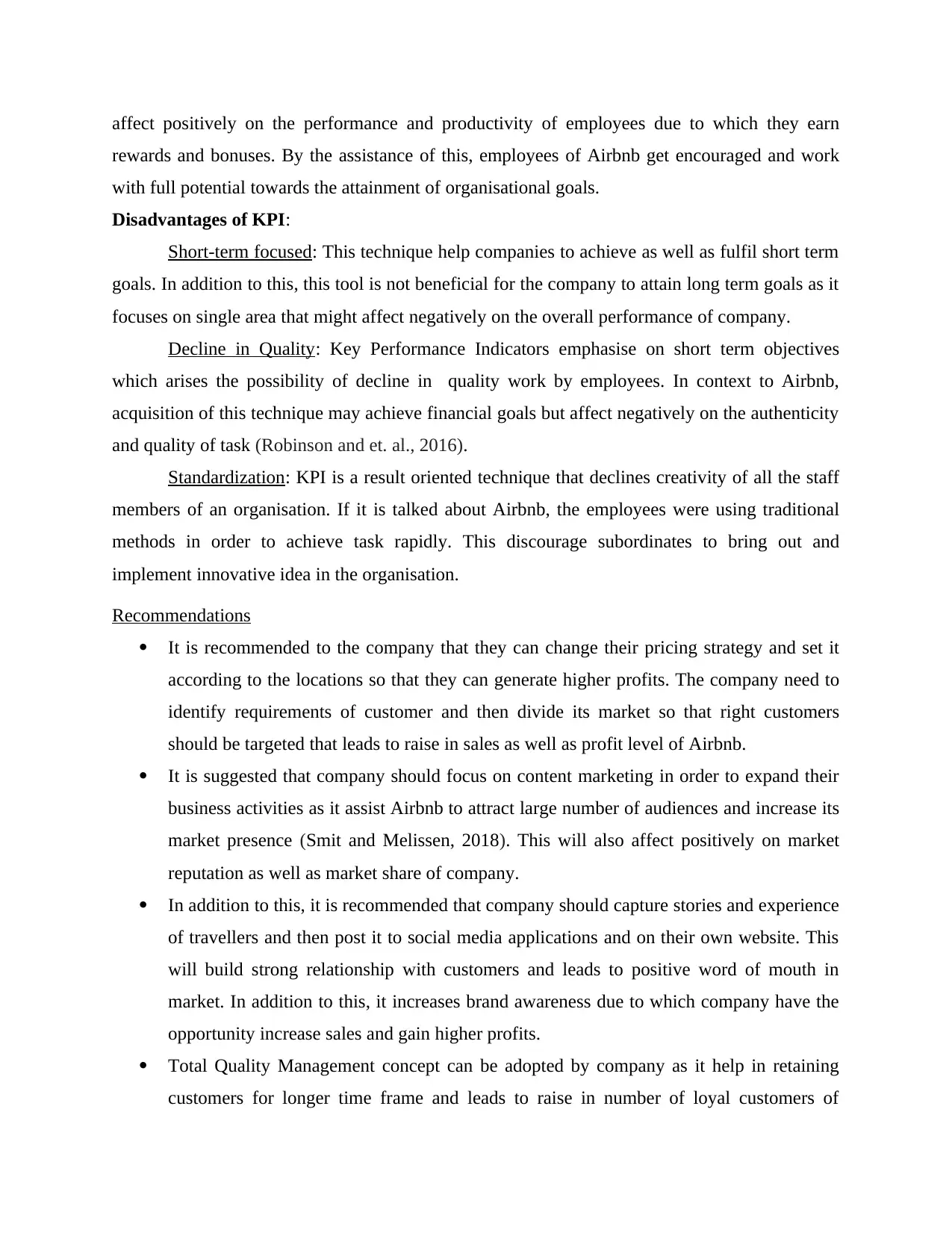
affect positively on the performance and productivity of employees due to which they earn
rewards and bonuses. By the assistance of this, employees of Airbnb get encouraged and work
with full potential towards the attainment of organisational goals.
Disadvantages of KPI:
Short-term focused: This technique help companies to achieve as well as fulfil short term
goals. In addition to this, this tool is not beneficial for the company to attain long term goals as it
focuses on single area that might affect negatively on the overall performance of company.
Decline in Quality: Key Performance Indicators emphasise on short term objectives
which arises the possibility of decline in quality work by employees. In context to Airbnb,
acquisition of this technique may achieve financial goals but affect negatively on the authenticity
and quality of task (Robinson and et. al., 2016).
Standardization: KPI is a result oriented technique that declines creativity of all the staff
members of an organisation. If it is talked about Airbnb, the employees were using traditional
methods in order to achieve task rapidly. This discourage subordinates to bring out and
implement innovative idea in the organisation.
Recommendations
It is recommended to the company that they can change their pricing strategy and set it
according to the locations so that they can generate higher profits. The company need to
identify requirements of customer and then divide its market so that right customers
should be targeted that leads to raise in sales as well as profit level of Airbnb.
It is suggested that company should focus on content marketing in order to expand their
business activities as it assist Airbnb to attract large number of audiences and increase its
market presence (Smit and Melissen, 2018). This will also affect positively on market
reputation as well as market share of company.
In addition to this, it is recommended that company should capture stories and experience
of travellers and then post it to social media applications and on their own website. This
will build strong relationship with customers and leads to positive word of mouth in
market. In addition to this, it increases brand awareness due to which company have the
opportunity increase sales and gain higher profits.
Total Quality Management concept can be adopted by company as it help in retaining
customers for longer time frame and leads to raise in number of loyal customers of
rewards and bonuses. By the assistance of this, employees of Airbnb get encouraged and work
with full potential towards the attainment of organisational goals.
Disadvantages of KPI:
Short-term focused: This technique help companies to achieve as well as fulfil short term
goals. In addition to this, this tool is not beneficial for the company to attain long term goals as it
focuses on single area that might affect negatively on the overall performance of company.
Decline in Quality: Key Performance Indicators emphasise on short term objectives
which arises the possibility of decline in quality work by employees. In context to Airbnb,
acquisition of this technique may achieve financial goals but affect negatively on the authenticity
and quality of task (Robinson and et. al., 2016).
Standardization: KPI is a result oriented technique that declines creativity of all the staff
members of an organisation. If it is talked about Airbnb, the employees were using traditional
methods in order to achieve task rapidly. This discourage subordinates to bring out and
implement innovative idea in the organisation.
Recommendations
It is recommended to the company that they can change their pricing strategy and set it
according to the locations so that they can generate higher profits. The company need to
identify requirements of customer and then divide its market so that right customers
should be targeted that leads to raise in sales as well as profit level of Airbnb.
It is suggested that company should focus on content marketing in order to expand their
business activities as it assist Airbnb to attract large number of audiences and increase its
market presence (Smit and Melissen, 2018). This will also affect positively on market
reputation as well as market share of company.
In addition to this, it is recommended that company should capture stories and experience
of travellers and then post it to social media applications and on their own website. This
will build strong relationship with customers and leads to positive word of mouth in
market. In addition to this, it increases brand awareness due to which company have the
opportunity increase sales and gain higher profits.
Total Quality Management concept can be adopted by company as it help in retaining
customers for longer time frame and leads to raise in number of loyal customers of
⊘ This is a preview!⊘
Do you want full access?
Subscribe today to unlock all pages.

Trusted by 1+ million students worldwide
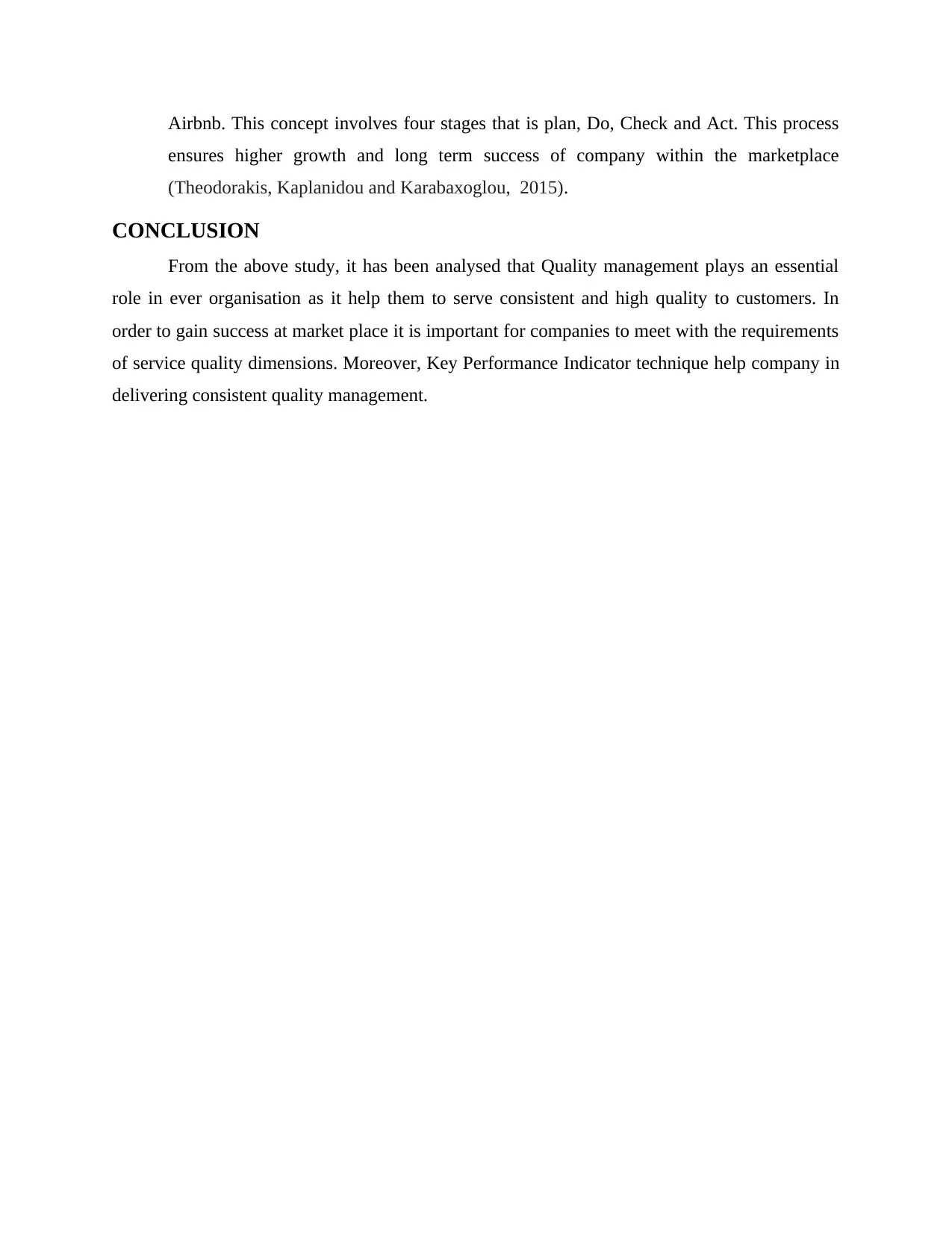
Airbnb. This concept involves four stages that is plan, Do, Check and Act. This process
ensures higher growth and long term success of company within the marketplace
(Theodorakis, Kaplanidou and Karabaxoglou, 2015).
CONCLUSION
From the above study, it has been analysed that Quality management plays an essential
role in ever organisation as it help them to serve consistent and high quality to customers. In
order to gain success at market place it is important for companies to meet with the requirements
of service quality dimensions. Moreover, Key Performance Indicator technique help company in
delivering consistent quality management.
ensures higher growth and long term success of company within the marketplace
(Theodorakis, Kaplanidou and Karabaxoglou, 2015).
CONCLUSION
From the above study, it has been analysed that Quality management plays an essential
role in ever organisation as it help them to serve consistent and high quality to customers. In
order to gain success at market place it is important for companies to meet with the requirements
of service quality dimensions. Moreover, Key Performance Indicator technique help company in
delivering consistent quality management.
Paraphrase This Document
Need a fresh take? Get an instant paraphrase of this document with our AI Paraphraser
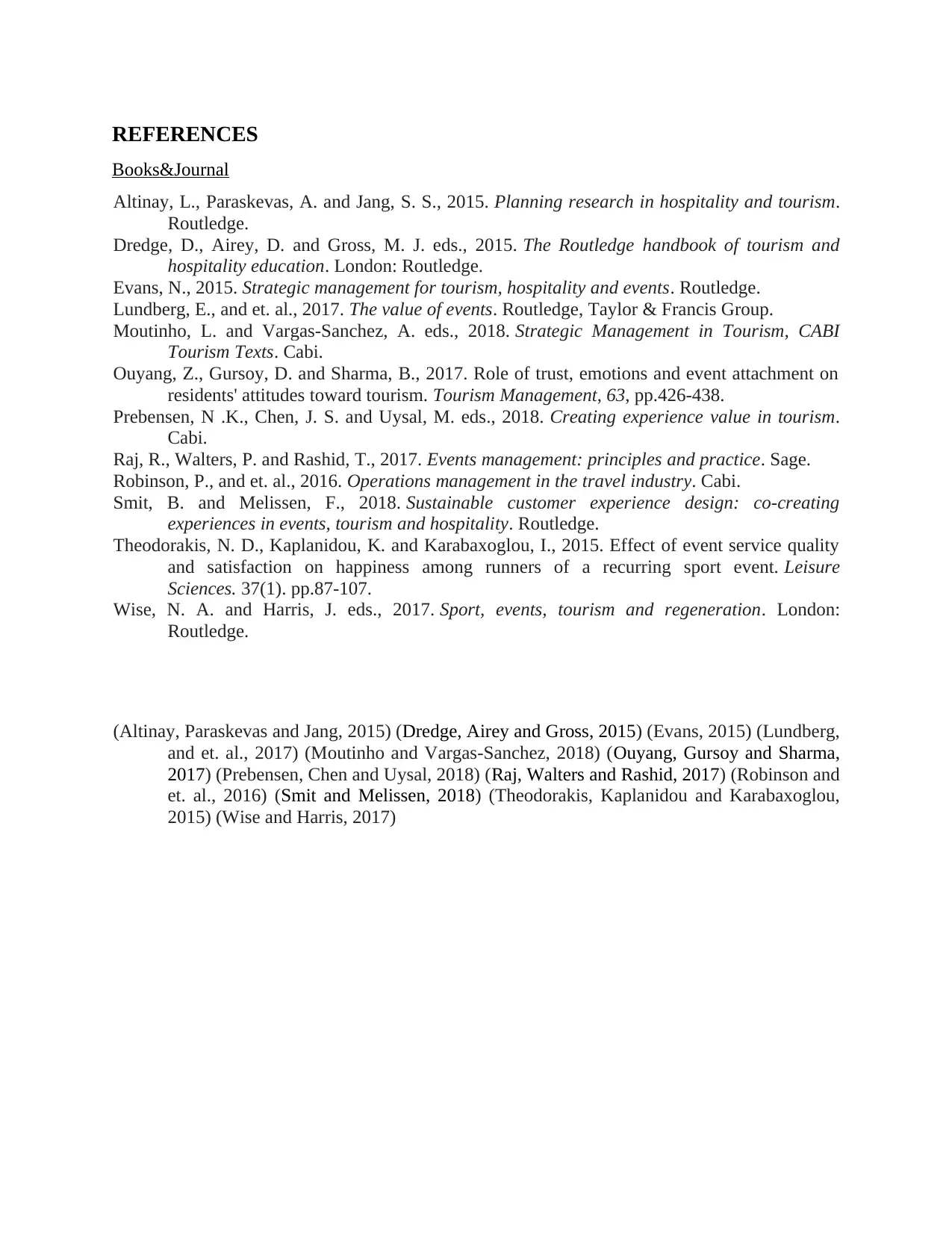
REFERENCES
Books&Journal
Altinay, L., Paraskevas, A. and Jang, S. S., 2015. Planning research in hospitality and tourism.
Routledge.
Dredge, D., Airey, D. and Gross, M. J. eds., 2015. The Routledge handbook of tourism and
hospitality education. London: Routledge.
Evans, N., 2015. Strategic management for tourism, hospitality and events. Routledge.
Lundberg, E., and et. al., 2017. The value of events. Routledge, Taylor & Francis Group.
Moutinho, L. and Vargas-Sanchez, A. eds., 2018. Strategic Management in Tourism, CABI
Tourism Texts. Cabi.
Ouyang, Z., Gursoy, D. and Sharma, B., 2017. Role of trust, emotions and event attachment on
residents' attitudes toward tourism. Tourism Management, 63, pp.426-438.
Prebensen, N .K., Chen, J. S. and Uysal, M. eds., 2018. Creating experience value in tourism.
Cabi.
Raj, R., Walters, P. and Rashid, T., 2017. Events management: principles and practice. Sage.
Robinson, P., and et. al., 2016. Operations management in the travel industry. Cabi.
Smit, B. and Melissen, F., 2018. Sustainable customer experience design: co-creating
experiences in events, tourism and hospitality. Routledge.
Theodorakis, N. D., Kaplanidou, K. and Karabaxoglou, I., 2015. Effect of event service quality
and satisfaction on happiness among runners of a recurring sport event. Leisure
Sciences. 37(1). pp.87-107.
Wise, N. A. and Harris, J. eds., 2017. Sport, events, tourism and regeneration. London:
Routledge.
(Altinay, Paraskevas and Jang, 2015) (Dredge, Airey and Gross, 2015) (Evans, 2015) (Lundberg,
and et. al., 2017) (Moutinho and Vargas-Sanchez, 2018) (Ouyang, Gursoy and Sharma,
2017) (Prebensen, Chen and Uysal, 2018) (Raj, Walters and Rashid, 2017) (Robinson and
et. al., 2016) (Smit and Melissen, 2018) (Theodorakis, Kaplanidou and Karabaxoglou,
2015) (Wise and Harris, 2017)
Books&Journal
Altinay, L., Paraskevas, A. and Jang, S. S., 2015. Planning research in hospitality and tourism.
Routledge.
Dredge, D., Airey, D. and Gross, M. J. eds., 2015. The Routledge handbook of tourism and
hospitality education. London: Routledge.
Evans, N., 2015. Strategic management for tourism, hospitality and events. Routledge.
Lundberg, E., and et. al., 2017. The value of events. Routledge, Taylor & Francis Group.
Moutinho, L. and Vargas-Sanchez, A. eds., 2018. Strategic Management in Tourism, CABI
Tourism Texts. Cabi.
Ouyang, Z., Gursoy, D. and Sharma, B., 2017. Role of trust, emotions and event attachment on
residents' attitudes toward tourism. Tourism Management, 63, pp.426-438.
Prebensen, N .K., Chen, J. S. and Uysal, M. eds., 2018. Creating experience value in tourism.
Cabi.
Raj, R., Walters, P. and Rashid, T., 2017. Events management: principles and practice. Sage.
Robinson, P., and et. al., 2016. Operations management in the travel industry. Cabi.
Smit, B. and Melissen, F., 2018. Sustainable customer experience design: co-creating
experiences in events, tourism and hospitality. Routledge.
Theodorakis, N. D., Kaplanidou, K. and Karabaxoglou, I., 2015. Effect of event service quality
and satisfaction on happiness among runners of a recurring sport event. Leisure
Sciences. 37(1). pp.87-107.
Wise, N. A. and Harris, J. eds., 2017. Sport, events, tourism and regeneration. London:
Routledge.
(Altinay, Paraskevas and Jang, 2015) (Dredge, Airey and Gross, 2015) (Evans, 2015) (Lundberg,
and et. al., 2017) (Moutinho and Vargas-Sanchez, 2018) (Ouyang, Gursoy and Sharma,
2017) (Prebensen, Chen and Uysal, 2018) (Raj, Walters and Rashid, 2017) (Robinson and
et. al., 2016) (Smit and Melissen, 2018) (Theodorakis, Kaplanidou and Karabaxoglou,
2015) (Wise and Harris, 2017)
1 out of 11
Related Documents
Your All-in-One AI-Powered Toolkit for Academic Success.
+13062052269
info@desklib.com
Available 24*7 on WhatsApp / Email
![[object Object]](/_next/static/media/star-bottom.7253800d.svg)
Unlock your academic potential
Copyright © 2020–2026 A2Z Services. All Rights Reserved. Developed and managed by ZUCOL.




